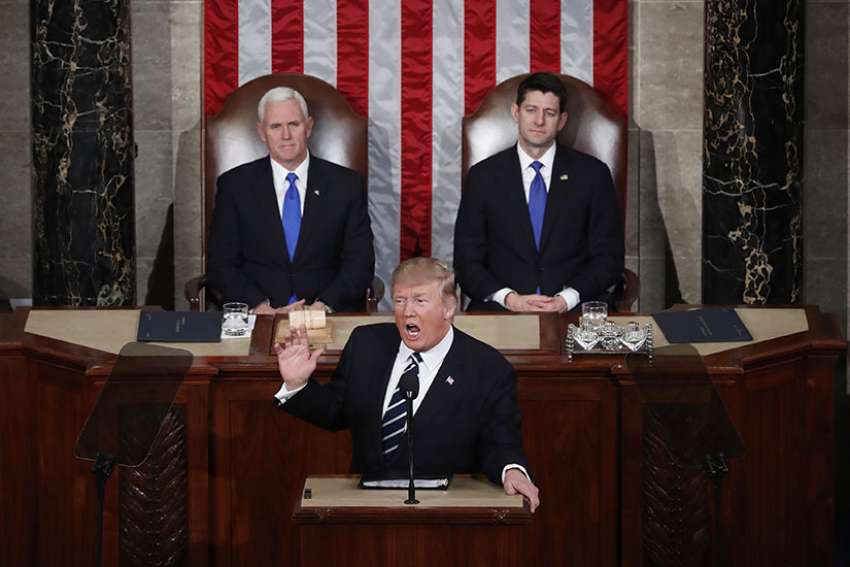Jeanne Mancini, president of the March for Life, lauded Trump for his emphasis on “the inherent dignity of the human person” in expressing concern for “persecuted religious minorities in the Middle East” and the need to care for military veterans.
“We are concerned, however, that we have not heard about pro-life protections in the healthcare replace plan from the White House and we would have liked to have heard that addressed last night,” Mancini said.
President Donald Trump’s first address to a joint session of Congress on Tuesday covered many topics, including border security, the “drug epidemic,” inner cities, aging infrastructure, and school choice, but he left out any specific mention of abortion or pro-life policies.
Congress is currently considering plans to repeal and replace the current health care law, but pro-life groups are concerned that problematic parts of the law – federal funding of abortions – may remain intact in the replacement plan.
These groups insist that the nation’s largest abortion provider Planned Parenthood be stripped of Medicaid funding as part of any repeal-and-replace plan – something House Speaker Paul Ryan promised would happen – but add that protections against federal funding of abortion coverage must also be extended in the replacement plan.
“The courts have ruled that abortion is health care,” the vice president of government affairs of the March for Life Tom McClusky explained to CNA.
“The American people, I believe, disagree with that, but until the courts are changed and the tax code is changed, any health care legislation, to be pro-life, needs to specifically address the pro-life issue,” he said.
One large concern of pro-life groups is that under the Affordable Care Act, federal subsidies were quite possibly funding abortion coverage in health plans offered on state exchanges.
When the Affordable Care Act was finally passed in 2010 and signed into law, the last Democrats to hold out in opposition changed their vote when President Obama promised an executive order forbidding funding of abortion coverage under the law. Pro-life leaders insisted that the promise would not have sufficient authority to stop such funding.
A 2014 Government Accountability Office report had found that the protocol set up to ensure separate billing of abortion coverage in health plans offered on the state exchanges was not being followed. This allowed for the possibility that federal subsidies for health coverage were directly funding abortion coverage.
Also, in several states, every plan offered on the exchanges included abortion coverage, an outrage to pro-lifers shopping for health plans that did not cover abortions.
McClusky explained other problematic areas of abortion funding in health care, including the use of refundable tax credits to purchase abortion coverage or plans with abortion coverage, and the need to extend abortion funding prohibitions to any increase in funding of community health centers.
Another concern he had was that “pro-life language” in a replacement bill could get stripped away by the Senate Parliamentarian.
However, something must be done to directly address these concerns, he insisted, because to do nothing would ensure the status quo.
“There’s no way that pro-life groups could oppose a bill that expands abortion in the U.S., meaning Obamacare, because the Democrats pass it – and then sit idly by, because the Republicans are passing this one it’s okay,” he insisted.
Mancini praised other pro-life actions by President Trump from his first 40 days in office, including his nomination of Judge Neil Gorsuch to the Supreme Court and his reinstatement of the Mexico City Policy, which forbids the U.S. from funding international non-government organizations that perform or promote abortions.
“We look forward to the continued commitment to pro-life priorities and urge Congress to pass the No Taxpayer Funding for Abortion Act and the Pain Capable 5-month abortion ban, and for the President to sign both into law,” she added.
Elsewhere in his Monday speech, Trump mentioned school choice, calling education “the civil rights issue of our time.”
“I am calling upon members of both parties to pass an education bill that funds school choice for disadvantaged youth, including millions of African-American and Latino children,” he stated.
“These families should be free to choose the public, private, charter, magnet, religious, or homeschool that is right for them.”
School choice is an issue that affects many Catholic families, as many parents may wish to send their child to Catholic school or homeschool them for religious reasons.
For instance, in January, Jason Calvi of EWTN News Nightly reported on Archbishop Carroll High School in Washington, D.C., a Catholic school where “half of the 380 kids receive a voucher” to attend through a D.C. scholarship program.
Speaking for homeschoolers, William A. Estrada, director of federal relations at the Home School Legal Defense Association, said he was “very pleased” that President Trump mentioned school choice and said that “it’s a measure of how successful home schooling is and how it has evolved.”
Two million students are homeschooled in the U.S. according to Department of Education estimates, he said.
Estrada insisted that families who choose to homeschool their children must be free to do so, untethered from federal funding which can carry hidden mandates on education. For that reason, the association opposes the bill H.R. 610 in Congress which would give vouchers to homeschooling families.
Also, with the Federal Higher Education Act homeschooled students who complete high school nevertheless are classified as those without diplomas. Certain state college systems in New York and California do not accept homeschooled students, he noted. Such students should be allowed to receive diplomas for completing all their high school courses, he insisted.
“That’s actually a real-world example of where Congress could act to improve freedom for homeschool families and homeschool graduates,” he said.
(Story from the Catholic News Agency)


